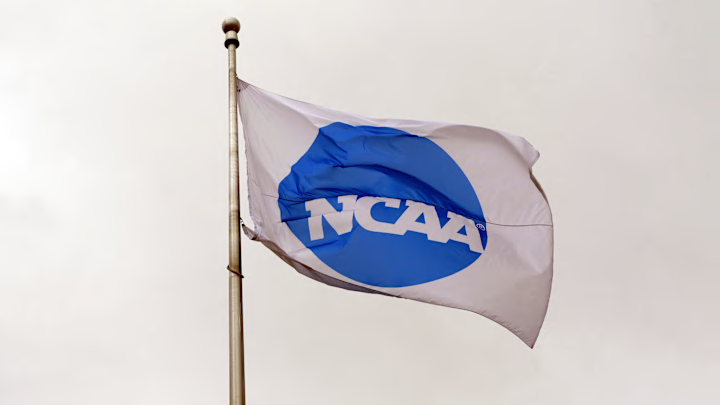Current and former college athletes claim House v. NCAA settlement ‘undercompensates female athletes’

A California-based judge overseeing three antitrust lawsuits against the NCAA is set to weigh in Thursday on a multibillion dollar proposal that will introduce a new compensation model for student-athletes.
The $2.8 billion agreement between the NCAA, its power conferences and a class of former Division-I athletes could reshape the future of college athletics. If it receives preliminary approval, thousands of current and former student-athletes will receive back pay from the NCAA over the next decade, while schools will be able to share revenue directly with their athletes.
As Judge Claudia Wilken gathers information from the plaintiffs and defendants, she’ll listen to arguments from multiple groups who have come forward to file formal objections and raise concerns over the settlement’s validity since its terms were submitted back in July.
A group of former and current women’s student-athletes object that the settlement is unfair to female athletes since a bulk of the back pay will go to former men’s basketball and football players. Those demographics are expected to garner 95% of the total NIL payments while the remaining amounts are set to be split between women’s basketball players and every other Division-I athlete.
“The proposed NIL settlement is a far cry from the fair and equitable relief it promises to former collegiate athletes,” said attorney Michelle Simpson Tuegel, who represents the group of women athletes, in a statement. “As it stands, the settlement undercompensates female athletes, with all but a few select basketball players receiving a measly $125, while thousands of male football and basketball players would secure over $100,000. For the retroactive payments to be fair and for this settlement to be truly revolutionary, as it’s proclaimed to be, then women and athletes beyond men’s football and basketball deserve a far greater share of the wealth."
According to the official objection that was obtained by Gonzaga Nation, the group argues that the settlement “undercompensates” women athletes’ NIL damages in part because the payment model reflects revenue driven from “historic sports revenues” that are a result of “discriminatory practices” from the NCAA. The complaint highlights the NCAA’s self investigation from 2021 that found the governing body perpetuates gender inequities through its prioritization of men’s basketball. Most of the NCAA’s share in the settlement derives from money generated through the men’s basketball tournament.
As such, the group argues that “absent the NCAA’s anticompetitive model,” women’s NIL values would be much higher, according to the document.
The settlement also creates a “price-fixing cartel” in regard to how much student-athletes can be paid under the new revenue-sharing model, per the document, and that the settlement substitutes one anticompetitive agreement for another. Under the settlement’s terms, schools will be allowed to share up to 22% of their revenue — about $23.1 million — per year with their student-athletes starting in the 2025-26 academic year. The group contends that student-athletes will be underpaid as the 10-year agreement moves along because the “spending cap” is fixed on less than a 1% annual increase and not tied to the specific revenue amount that the schools generate, which seemingly grows year by year.
Additionally, the group contends that the settlement is an attempt to give the NCAA and its conferences more control over NIL deals. The settlement states that the NCAA and the Power Five schools have veto power over NIL deals between players and third parties depending on if the deal is “for a valid business purpose.”
“By setting a cap on how much each school may pay its athletes, the Settlement entrenches a zero-sum game where class members must compete with one another for a share of the artificially limited compensation pool,” the objection read. “In practice, those limited funds are likely to be allocated overwhelmingly to historically revenue-generating sports – particularly men’s football and basketball – at the expense of all other sports. Those pervasive conflicts suggest a fatal lack of adequate representation.”
The objection raises concern over the fairness, adequacy and rationale of the settlement by arguing that it strikes a “global compromise” of all the claims brought forward, though the interests of the various class members are conflicting and differ.
“Class members have been left in the dark throughout the settlement process,” the objection read. “Based on the face of the Settlement, what they can be assured of is that their interests have not been properly accounted for.
The complaints brought forward by the group of women student-athletes is one of many formal objections Wilken will hear on Thursday. Lawyers who are involved with a similar student-athlete compensation lawsuit in Colorado argue the NCAA is undervaluing the claims made by the student-athletes and seek a pay-for-play system in which schools can pay their athletes for their athletic services (which is different than using their name, image and likeness). The Colorado group valued the claims at $24.3 billion based on a estimate from an economist. They argued that a cap can’t be enforced without going through collective bargaining first, which would involve negotiating with student-athletes.
The National College Players Association announced it stands in opposition of the multibillion dollar settlement, saying it would create rules that would allow schools to decrease the money and scholarships currently flowing to athletes.
If Wilken grants the preliminary approval, class members will have a window to opt out of the deal of raise any further objections. She also doesn’t have to decide anything on Thursday and could make a ruling days or weeks after the fact.
